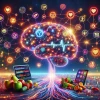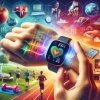
In a world where health information is abundant yet often overwhelming, machine learning emerges as a beacon of personalized guidance. Imagine a future where your health decisions are not just informed by generic advice but tailored specifically to you, leveraging data from your lifestyle, genetic makeup, and even real-time physiological responses. This isn't a distant dream; it's the frontier of healthcare, powered by machine learning. Let's delve into why this technology is not just beneficial but essential for personalized health recommendations.
The Intersection of Health and Technology
The intersection of health and technology is like a bustling crossroads, where traditional medical practices meet cutting-edge innovations. Machine learning, a subset of artificial intelligence, stands at this junction, ready to revolutionize how we approach our well-being. At its core, machine learning involves algorithms that learn from data, identifying patterns and making decisions with minimal human intervention. This capability is particularly transformative in healthcare, where the data is vast and complex.
Personalization: The New Norm in Healthcare
Consider the analogy of a tailored suit versus off-the-rack clothing. While the latter might fit adequately, the former contours perfectly to your shape and style. Similarly, personalized health recommendations adapt to the individual nuances of each person, considering factors like genetics, environment, and lifestyle. Machine learning excels in this domain by analyzing diverse data points, from electronic health records to wearable device metrics, crafting recommendations that are as unique as your fingerprint.
Real-World Applications: From Wearables to Genomics
In practice, machine learning applications are already enhancing our health experiences. Take wearables, for instance. Devices like smartwatches collect data on your heart rate, sleep patterns, and physical activity. Machine learning algorithms process this data to offer insights into your health, such as predicting potential heart conditions or suggesting optimal workout routines. Similarly, in genomics, machine learning assists in interpreting complex genetic information, paving the way for personalized medicine that targets treatments based on individual genetic profiles.
Common Pitfalls and How to Avoid Them
While the potential is immense, the journey to personalized health recommendations via machine learning is not without its challenges. One common mistake is over-reliance on data without considering the context. For instance, a sudden spike in heart rate could be due to exercise or stress, and algorithms need to differentiate between these scenarios. Another pitfall is data privacy concerns. It's crucial to ensure that personal health data is securely handled and consented to by users. Avoiding these pitfalls requires a balance of technological sophistication and ethical vigilance.
The Future: Integrating Machine Learning into Everyday Health
Looking ahead, the integration of machine learning into everyday health routines is poised to become as routine as brushing your teeth. Imagine a world where your daily health decisions, from diet to exercise to medication, are guided by insights derived from continuous learning and adaptation. This future is not just about technology but about enhancing human potential, enabling individuals to live healthier, more informed lives. As machine learning evolves, so too will its ability to understand and predict health outcomes, making personalized health recommendations not just a luxury but a standard.































